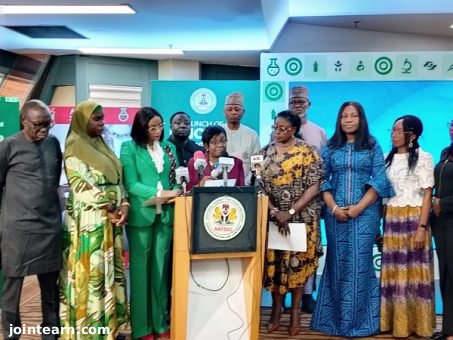
The National Agency for Food and Drug Administration and Control (NAFDAC) has fixed January 2026 for the full enforcement of the total ban on the production and sale of alcoholic beverages in sachets and small bottles below 200 millilitres.
The agency’s Director-General, Prof. Mojisola Adeyeye, announced that the December 2025 deadline marks the final moratorium for producers, distributors, and retailers to phase out such products. She emphasized that no further extensions will be granted.
“This ban is not punitive; it is protective. We cannot continue to sacrifice the well-being of Nigerians, especially our children, for short-term economic gain. The health of the nation is its true wealth,” Adeyeye stated.
Protecting Children and Curbing Alcohol Abuse
According to NAFDAC, the decision — backed by the Senate and the Federal Ministry of Health and Social Welfare — aims to protect children, adolescents, and young adults from the harmful effects of alcohol abuse.
Prof. Adeyeye said the widespread sale of cheap, high-alcohol-content drinks in small sachets and bottles has contributed to rising addiction rates, domestic violence, road accidents, and other social vices.
She noted that such packaging makes alcohol easily accessible and concealable, posing a serious public health and security threat.
Background and Implementation Timeline
The phase-out of small-volume alcoholic beverages began in December 2018, when NAFDAC, the Federal Ministry of Health, the Federal Competition and Consumer Protection Commission (FCCPC), and key industry groups such as the Association of Food, Beverage and Tobacco Employers (AFBTE) and the Distillers and Blenders Association of Nigeria (DIBAN) signed a five-year agreement to end production by January 2024.
The deadline was later extended to December 2025 to allow manufacturers to exhaust old stock and reconfigure their production lines.
Adeyeye added that the decision aligns with the World Health Organization (WHO) Global Strategy to Reduce the Harmful Use of Alcohol (Resolution WHA63.13, 2010), to which Nigeria is a signatory.
Addressing Concerns About Job Losses
Responding to industry concerns about potential job losses, the NAFDAC DG said the health and safety of Nigerians outweigh short-term economic interests.
“Job loss was raised in 2018, and we extended the phase-out period to allow adequate planning. How long will we continue to cite job loss while our children are dying and becoming addicts?” she asked.
“Children drinking alcohol is a ticking time bomb. Research shows that children who start drinking early are more likely to progress to hard drugs — that’s a national security threat.”
Stronger Enforcement and Collaboration
Prof. Adeyeye disclosed that NAFDAC has strengthened its enforcement framework with support from the Office of the National Security Adviser (ONSA) and other security agencies.
She revealed that during a February 2025 enforcement operation across markets in Idumota, Aba, and Onitsha, ONSA deployed over 1,350 personnel to assist NAFDAC’s operations.
The agency’s Enforcement Directorate now chairs the Federal Task Force on Counterfeit and Substandard Products, recently inaugurated by the Minister of Health, with similar task forces established in all 36 states and the FCT.
NAFDAC has also received government approval to recruit 1,000 additional staff to enhance surveillance and enforcement nationwide.
Public Sensitization and Health Awareness
Adeyeye affirmed that NAFDAC will continue working with the Federal Ministry of Health, FCCPC, and the National Orientation Agency (NOA) to intensify public awareness campaigns on the health and social risks of alcohol misuse.
“This ban is rooted in science, public health, and national interest. It’s about protecting our children, our future workforce, and our nation’s stability. This is a collective responsibility — not just for NAFDAC, but for all Nigerians,” she stressed.


Leave a Reply